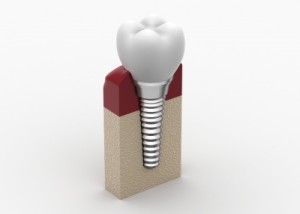 Dental implants are artificial tooth roots that are placed into your jaw to hold replacement teeth. A dental implant may be an option for people who have lost a tooth or teeth due to an injury, periodontal disease, or some other reason.
Dental implants are artificial tooth roots that are placed into your jaw to hold replacement teeth. A dental implant may be an option for people who have lost a tooth or teeth due to an injury, periodontal disease, or some other reason.
Benefits of Implants over Other Treatments
A dental implant looks and feels natural that you may forget you ever lost a tooth. And, because they are designed to fuse with bone, they become permanent. They are particularly practical for patients who can no longer wear removable dentures. Implants eliminate the discomfort of removable dentures because they become part of you.
Other benefits of dental implants include:
~ Improved confidence and self-esteem. Implants can give you back your smile and help you feel better about yourself.
~ Dental implants do not need teeth reduction, unlike a tooth-supported bridge. More of your own teeth are left intact because nearby teeth are not altered to support the implant; thereby improving long-term oral health. Individual dental implants also allow easier access between teeth for better oral hygiene.
~ Implants are very durable and will last many years. Dental implants can last a lifetime with good care.
~ Renewed capacity to speak and eat properly. The teeth could slip within the mouth causing you to mumble or slur your words with poor-fitting dentures. Implants let you communicate without worrying that your teeth might slip. Likewise, sliding dentures can make chewing difficult. Dental implants function like your own teeth, allowing you to eat your favorite food with confidence and without pain.
Types of Dental Implants
Endosteal (in the bone)
This is the most commonly used type of implant. This type includes blades, cylinders, or screws surgically placed into the jawbone. Each dental implant holds one or more prosthetic teeth. This type of implant is generally used as an alternative for patients with bridges or removable dentures.
Subperiosteal (on the bone)
These are placed on top of the jaw with the metal framework’s posts protruding through the gum to hold the prosthesis. These types of dental implants are used for patients who are unable to wear conventional dentures and who have minimal bone height.
Are you a candidate for implants?
Generally, you are a candidate for dental implants if you have lost your teeth. However, there are some conditions and diseases that can affect whether implants are right for you. For instance, alcoholism, cancer, radiation to the jaws, smoking, uncontrolled diabetes, or uncontrolled gum disease may affect the success of dental implants. It is important to let your dental surgeon know all about your past and present medical status, together with all medications you are taking, may it be alternative/herbal, over-the-counter, or prescribed.
Implant Cost
The cost of a single dental implant can vary, depending on the region and who is performing the procedure. A conservative cost estimate for a single implant is $3,000 to $4,500. This cost includes the surgery for placement of dental implant, all the components, and the implant crown.
Dental insurance typically does not pay for dental implant placement. Some dental insurances may help pay for the implant crown portion. Unfortunately, in many cases, dental insurance considers dental implants an elective procedure, even though implants have become the standard of care for replacement of missing teeth. Dental implants have become a favored option for tooth replacement because they offer a conservative approach and provide predictable results with high success rates.
